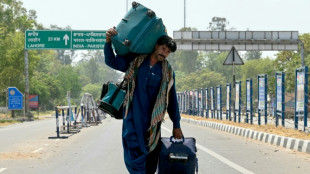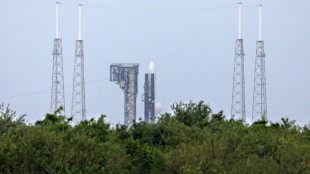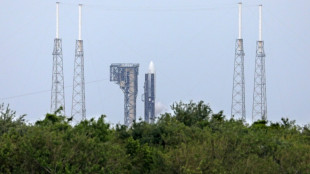
-
 Markets boosted as Trump softens tariff pain for auto firms
Markets boosted as Trump softens tariff pain for auto firms
-
Suryavanshi, 14, dubbed 'next superstar' after batting records tumble

-
 Australian doubles player Purcell accepts 18-month doping ban
Australian doubles player Purcell accepts 18-month doping ban
-
Kashmir attack unites political foes in India, Pakistan

-
 Croatia hotel toasts dizzying century of stars, sovereigns and champagne
Croatia hotel toasts dizzying century of stars, sovereigns and champagne
-
Kenya's desperate need for more snake antivenom

-
 Les Kiss in frame with Wallabies set to name new coach
Les Kiss in frame with Wallabies set to name new coach
-
Cavaliers scorch Heat, Warriors down Rockets in thriller

-
 Opposition wins Trinidad and Tobago election, returning Persad-Bissessar as PM
Opposition wins Trinidad and Tobago election, returning Persad-Bissessar as PM
-
Study sheds light on origin of Australia's odd echidna

-
 France tries Syrian Islamist rebel ex-spokesman on war crime charges
France tries Syrian Islamist rebel ex-spokesman on war crime charges
-
Trump boasts of 'fun' 100 days, but Americans disenchanted

-
 Elitist no more, caviar is turning casual
Elitist no more, caviar is turning casual
-
Amnesty accuses Israel of 'live-streamed genocide' against Gaza Palestinians

-
 Inter slump puts season at risk ahead of daunting Barca trip
Inter slump puts season at risk ahead of daunting Barca trip
-
Power returns to most of Spain, Portugal after massive blackout

-
 'I have hope': Vietnam Babylift survivor's search for birth mother
'I have hope': Vietnam Babylift survivor's search for birth mother
-
US climate assessment thrown into doubt as Trump dismisses authors

-
 Venezuelan president slams US over little girl's 'abduction'
Venezuelan president slams US over little girl's 'abduction'
-
Hard-right upstarts eye big gains in local UK polls

-
 Skulls, smoke and spirits: Thai ceremony for the unclaimed dead
Skulls, smoke and spirits: Thai ceremony for the unclaimed dead
-
Canada's Carney: political newcomer who says he's best in a crisis

-
 Cavaliers scorch Heat to seal series sweep
Cavaliers scorch Heat to seal series sweep
-
Dead salmon create election stink on Australian island

-
 Mic check: Singapore's podcast boom amplifies opposition voices
Mic check: Singapore's podcast boom amplifies opposition voices
-
Markets rise as traders gear up for earnings, key jobs data

-
 Congress passes 'revenge porn' ban, sending it to Trump
Congress passes 'revenge porn' ban, sending it to Trump
-
Spain and Portugal work to restore power after massive blackout

-
 Less-thirsty rice offers hope in drought-stricken Chile
Less-thirsty rice offers hope in drought-stricken Chile
-
Yamal stardust could give Barca edge on Inter Milan

-
 Coca-Cola Europacific Partners plc Announces Q1 Trading Update & Interim Dividend Declaration
Coca-Cola Europacific Partners plc Announces Q1 Trading Update & Interim Dividend Declaration
-
Trump targets US 'sanctuary cities' in migrant crackdown

-
 Mexico agrees to send water to US after Trump threatens tariffs
Mexico agrees to send water to US after Trump threatens tariffs
-
Amazon launches first Starlink-rival internet satellites

-
 US lost seven multi-million-dollar drones in Yemen area since March
US lost seven multi-million-dollar drones in Yemen area since March
-
Bucks blow as Lillard suffers torn Achilles: team

-
 Putin orders three-day truce amid new US warnings
Putin orders three-day truce amid new US warnings
-
Real Madrid's Ancelotti agrees Brazil deal - reports

-
 ChatGPT adds shopping help, intensifying Google rivalry
ChatGPT adds shopping help, intensifying Google rivalry
-
Global stocks mixed amid trade hopes as markets await tech earnings

-
 Commanders heading back to D.C. after inking $3.7 bln stadium deal
Commanders heading back to D.C. after inking $3.7 bln stadium deal
-
US warplane falls off aircraft carrier into Red Sea

-
 Feisty Arteta urges Arsenal fans to 'bring boots' to PSG Champions League clash
Feisty Arteta urges Arsenal fans to 'bring boots' to PSG Champions League clash
-
Bucks blow as Lillard suffers ruptured Achilles: reports

-
 No power, no phone, no transport -- Spain in a panic
No power, no phone, no transport -- Spain in a panic
-
US warplane went overboard into Red Sea: Navy

-
 'Like a dream' as IPL's 14-year-old Suryavanshi becomes youngest to hit T20 ton
'Like a dream' as IPL's 14-year-old Suryavanshi becomes youngest to hit T20 ton
-
Luis Enrique says PSG have improved since October Arsenal loss

-
 UN food, refugee agencies warn of huge cuts after funding losses
UN food, refugee agencies warn of huge cuts after funding losses
-
Trump trade war dominates BRICS meeting in Brazil


Japan 'Moon Sniper' lands but 'not generating power'
Japan on Saturday became only the fifth nation to achieve a soft Moon landing, but the craft's long-term fate was in doubt after space agency officials said its solar cells were not generating power.
With the Smart Lander for Investigating Moon (SLIM), Japan followed the United States, the Soviet Union, China and India in landing on the lunar surface.
After initial uncertainty, space agency JAXA confirmed that the SLIM touched down on the Moon at 12:20 am Japanese time (1520 GMT Friday) and that "communication has been established".
JAXA official Hitoshi Kuninaka said that without the solar cells functioning, the craft would only have power for "several hours".
But he suggested that it was possible that once the angle of the sun changed, they may work again.
"It is unlikely that the solar battery has failed. It's possible that it is not facing in the originally planned direction," Kuninaka told a news conference.
"If the descent was not successful, it would have crashed at a very high speed. If that were the case, all functionality of the probe would be lost. But data is being sent to Earth," he said.
He added that for now, the focus was on using what power remained to send back to mission control all data that had been acquired during the landing.
This would include helping to determine whether the craft -- dubbed the "Moon Sniper" for its precision -- achieved the aim of landing within 100 metres (yards) of its intended landing spot.
Two probes however detached successfully, JAXA said -- one with a transmitter and another designed to trundle around the lunar surface beaming images back to Earth.
This shape-shifting mini-rover, slightly bigger than a tennis ball and inspired by how a turtle moves on a beach, was co-developed by the firm behind Transformer toys.
- Mantle pieces -
Japan's mission is one of a string of new projects launched in recent years on the back of renewed interest in Earth's natural satellite.
Success would restore high-tech Japan's reputation in space after two failed lunar missions and recent rocket failures, including explosions after take-off.
It would also echo the triumph of India's low-cost space programme in August, when it became the first to land an uncrewed craft near the Moon's largely unexplored south pole.
SLIM was meant to try to reach a crater where the Moon's mantle -- the usually deep inner layer beneath its crust -- is believed to be accessible.
"The rocks exposed here are crucial in the search for the origins of the Moon and the Earth," Tomokatsu Morota, associate professor at the University of Tokyo specialising in lunar and planetary exploration, told AFP before the landing.
This includes shedding light on the mystery of the Moon's possible water resources, which will also be key to building bases there one day as possible stopovers on the way to Mars.
"The possibility of lunar commercialisation depends on whether there is water at the poles," Morota said.
- Renewed interest -
More than 50 years after the first human Moon landing, many countries and private companies are attempting to make the trip anew.
But crash-landings, communication failures and other technical problems are rife.
This month, US private firm Astrobotic's Peregrine lunar lander began leaking fuel after takeoff, dooming its mission.
On Thursday, contact with the spaceship was lost over a remote area of the South Pacific after it likely burned up in the Earth's atmosphere on its return.
NASA has also postponed plans for crewed lunar missions under its Artemis programme.
Russia, China and other countries from South Korea to the United Arab Emirates are also trying their luck.
Previous Japanese lunar missions have failed twice -- one public and one private.
In 2022, the country unsuccessfully sent a lunar probe named Omotenashi as part of the United States' Artemis 1 mission.
In April, Japanese startup ispace tried in vain to become the first private company to land on the Moon, losing communication with its craft after what it described as a "hard landing".
G.Stevens--AMWN
